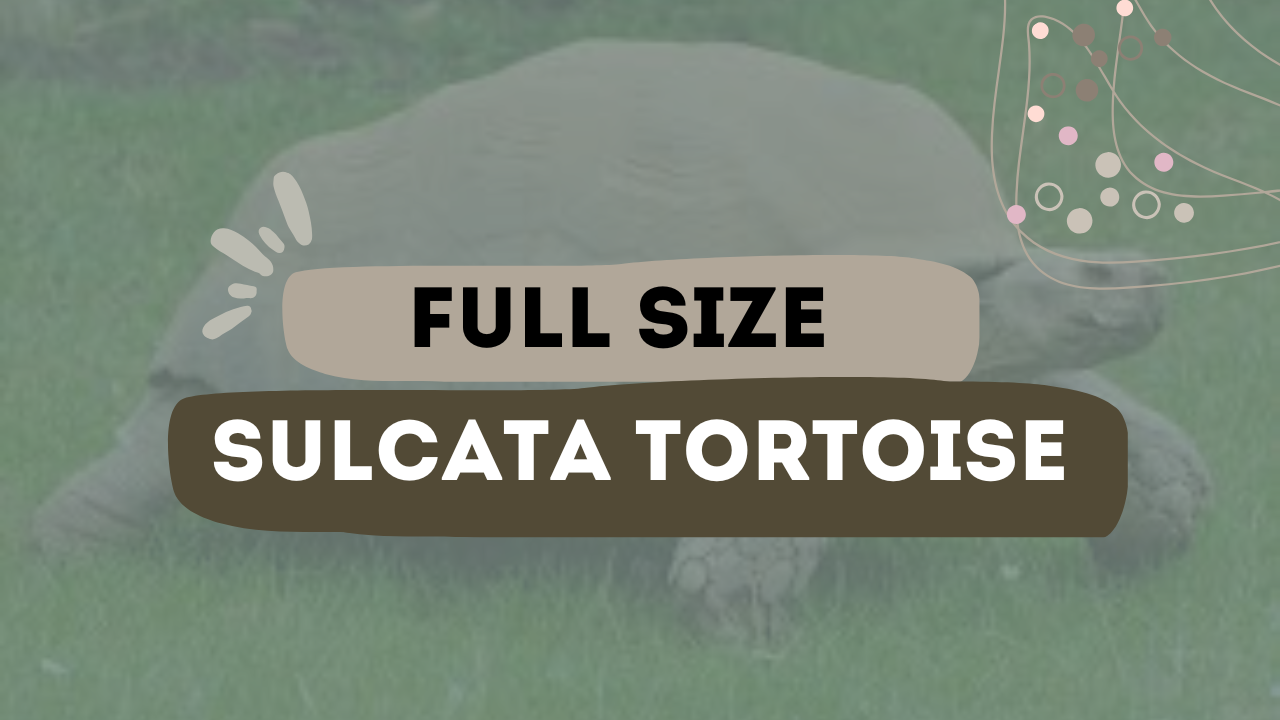If you’ve ever seen a giant tortoise slowly wandering across a backyard and thought, “I want one of those,” chances are it was a Sulcata tortoise. Also known as the African spurred tortoise, the Sulcata is one of the most popular and impressive pet tortoises in the world.
But before you rush out to adopt one, there’s a lot to consider. These gentle giants are fascinating, but they also require a serious commitment. In this post, we’ll cover everything you need to know about Sulcata tortoises including size, care, diet, habitat, and lifespan.
Table of Contents
What Is a Sulcata Tortoise?
The Sulcata tortoise (Centrochelys sulcata) is the third-largest tortoise species in the world and the largest mainland species. Native to the dry savannas of sub-Saharan Africa, Sulcatas are known for their size, strength, and long lifespan.
They are often called African spurred tortoises because of the spurs on their hind legs.
How Big Do Sulcata Tortoises Get?
One of the biggest surprises for new tortoise owners is how large these animals grow.
Average adult size: 24 to 30 inches long
Adult weight: 70 to 100 pounds or more
Growth rate: Rapid in the first 5 to 10 years
They start off tiny just a few inches but yk it can become massive in a relatively short time. Some full-grown Sulcatas can weigh over 150 pounds.
How Long Do Sulcata Tortoises Live?
Sulcata tortoises are long-term companions.
Lifespan: 50 to 100 years in captivity
Some may even outlive their owners, so it’s important to have a plan for their long-term care.
Sulcata Tortoise Diet
These tortoises are herbivores and need a high-fiber, low-protein diet to stay healthy.
Best Foods
- Grasses and hay (bermuda, orchard grass, timothy)
- Leafy greens (collard, mustard, turnip greens)
- Cactus pads (nopales)
- Weeds like dandelion and clover
Foods to Avoid
- Fruits (high in sugar)
- Animal protein (meat, dog food, etc.)
- Iceberg lettuce (low in nutrition)
Calcium is essential, so a calcium supplement without phosphorus should be added regularly.
Housing and Habitat Requirements
Sulcata tortoises need lots of space and a safe, dry environment.
Outdoor Enclosure (Preferred)
- Large, secure fenced area (they dig)
- Dry shelter for cold or wet weather
- Natural grass and grazing areas
Indoor Housing (for hatchlings or cold climates)
- Tortoise table or large indoor pen
- UVB lighting and basking lamps
- Humid hide for hydration
Note: Full-size adults should live outdoors year-round in warm climates. They are not ideal for apartment living or small yards.
Do Sulcata Tortoises Hibernate?
No, Sulcatas do not hibernate. They come from hot, arid regions and must be kept warm all year. If temperatures drop below 60°F (15°C), they need heat and shelter to prevent illness.
Behavior and Temperament
Sulcatas are friendly but strong-willed.
- Generally docile and calm
- Can be surprisingly active and curious
- Known to dig large burrows and bulldoze obstacles
- Can bond with owners but aren’t cuddly pets
They do not get along well with other tortoise species and may become territorial.
Health and Veterinary Care
Sulcatas are hardy but can develop issues if their diet or environment isn’t right.
Common Problems
- Shell pyramiding (due to poor diet or humidity)
- Respiratory infections (from cold or damp enclosures)
- Parasites
- Overgrown beaks or nails
Annual vet checkups with a reptile specialist are highly recommended.
Is a Sulcata Tortoise Right for You?
A Sulcata tortoise is not a low-maintenance pet. They live for decades, get huge, need space, and aren’t easy to rehome. But if you have the room, time, and dedication, they can be rewarding and amazing animals to care for.
Before getting one, ask yourself:
- Do I have enough outdoor space?
- Can I commit to a pet for 50+ years?
- Am I okay with large, messy reptiles?
- Do I live in a warm climate or can I provide heated shelter?
Final Thoughts
Sulcata tortoises are one of the most impressive reptiles you can own, but they’re also a serious long-term responsibility. With proper care, they can live a long, healthy life and become a unique part of your family.
If you’re ready for the challenge, the Sulcata tortoise might just be your perfect prehistoric companion.

